英语句子种类与类型
句子种类和类型
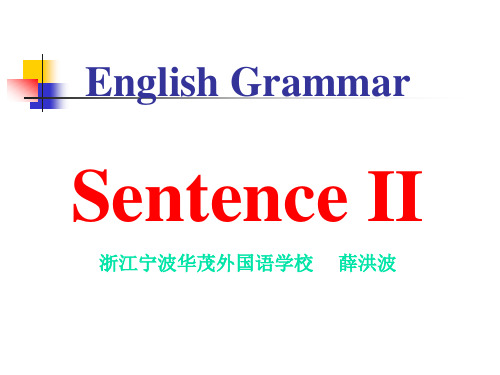
…or,neither…nor,not only…,but also,as
well as等来连接。
二
、
He is a basketball fan, and his wife is a volleyball fan.句
Honey is sweet, but the bee stings.
子 类
Don’t be late, for there is a meeting.
---No, I haven’t.
2)特殊疑问句 疑问词有
who,whose,what,which,where,when,why,how等。
(1)陈述语序
I
Who was the first man in space?
、
(2)倒装语序
句 子
Who are you talking about?
种
类
注:A、简略式
However,no matter how,whether) 。
3、复合句
并列复合句 即并列连词连接了带
从句的并列句。
二
、
English is widely used in the world, but China 句
has the largest number of people who speak 子
I
1.Tom hardly knows French, ______ ______?
、
2.—Mary didn't fail her exam, did she?
句
---______, she didn‘t.
子
种
3.You needn’t come, ______ you?
句子种类和类型

Sentence II
浙江宁波华茂外国语学校 薛洪波
a
1
英语句子种类与类型
纲 提 I、句子种类(按交际用途分) 陈述句、疑问句、祈使句、感叹句、 THERE-BE存在句 II、句子类型(按句子结构分)
简单句、并列句、复合句、并列复合句
a
2
I、句子种类(按交际用途分)
How shall we go there? By bus or by train?
a
7
4)反义疑问句 问:+,-?或-,+? 答:+,+. 或-,-.
I
1.Tom hardly knows French, ______ ______? 2.—Mary didn't fail her exam, did she?
a
4
I
2、疑问句 有一般疑问句、特殊疑问句、选择
疑问句、反义疑问句。
1)一般疑问句 用来询问一件事,答案通常是yes或
no,注意语序。
类、
Have you anything to say?
句
Did someone phone you understand it?
类、 句 子 种
9.There is no doubt() about it, ______ ______ ?
10.Anna hasn’t got to go to school on Sunday, ______ she?
a
9
3、祈使句
表达命令、要求、请求、劝告等,用原形。
I
1)带第二人称的祈使句 Be quiet, please. Don’t make any noise!
句子的种类

句子的种类英语中句子可以分为四种类型,即陈述句,疑问句,祈使句和感叹句.一陈述句陈述句是用来陈述一项事实的句子,它有明确的主语和谓语部分.如果不是在特殊条件下有意倒装,正常语序应是”主语+谓语动词”的顺序.它包括肯定句和否定句.He is a student.We went to Canada yesterday.They haven’t finished their homework.You should get up earlier next time.二,疑问句疑问句是用来提出疑问的句子,句末用问号.它又可分为一般疑问句,特殊疑问句,选择疑问句和反意疑问句/附加疑问句.1.一般疑问一般疑问句是用yes 或no 回答的问句,常意为”……吗?”朗读时句末用升调.(1)含有情态动词的一般疑问句,通常是把情态动词提前来表示疑问语气,答语中仍用该情态动词.Will they go to the town tomorrow?Yes, they will,/ No,they won’tCan you speak English ?Yes,I can / No, I can’t注意: 对may, must 的否定回答,根据含义不能保证在情态动词上对应一致,May I smoke here ?No, you mustn’t .It’s dangerous.May I borrow your bike ?Sorry/No,you can’t ,My wife is using it now .Must I finish the work now ?No,you needn’t You can finish it tomorrow.当情态动词开头的问句表示”征求意见”或”提供帮助”时,答语要灵活运用.Can I help you ?Yes, pleaseShall we go now ?Ok/All right / Good idea.(2)系动词BE 独立作谓语的句子通常是把be提前以表示疑问语气.Are you a doctor ?Is your mother American ?(3)句中含有助动词的,把助动词提前倒装以表示疑问语气.Have you a new dictionary ?Yes,I haveHave you met him before ?Yes, I have/ No, I haven’t(4)实义动词原形独立作谓语时,要借助do的适当形式提前来表示疑问.Do you understand me ?Yes, I do /No, I don’tDoes she like music ? Yes, she does/ No, she doesn’tDid you do your lessons last night ? Yes,I did / No, I didn’t2.特殊疑问句特殊疑问句是由”疑问词+一般疑问句”构成的,根据疑问部分在句子中所作的成分而确定使用哪个疑问词.(1)特殊疑问句是由疑问代词what, who, whom ,which,whose., 或疑问副词when, where , why , how 引导的疑问句.What are you going to do tomorrow?Who will teach you English next term ?Which book is yours ?Whose son was ill yesterday?(2)对于不同句子成分和不同情况提问,要求用不同的特殊疑问词.A WHO 对主语进行提问Who is that boy?B, whom/who 对宾语进行提问Whom are you waiting for ?C,whose 对定语进行提问Whose bike is broken ?D,how many 对可数名词的数量提问How many books do you have ?E, how much 对不可数名词的数量提问How much water is there in the bottle ?F when 对具体时间进行提问, when will you go ?G what time 对”钟点”进行提问What time did you get up this morning?H, how often 对表示频率的词进行提问: How often do you write to your father ?I, How soon 对表示”多久以后”进行提问: How soon will they come back?J How long 对表示一段时间的时间状语提问: How long have you worked here ?K where 对表示地点的状语提问: where have you been ?L how 对表示”如何”进行提问. How was your mother then ?M, why 对原因进行提问. Why were you late for the meeting?N, what 对表示”什么”进行提问: What will your mother say to you ?3.选择疑问句选择疑问句是用选择连词or 将提出询问的可选择的部分连接起来.可选择部分可以指人,事物,动作,状态,地点或行为方式等.若可选择部分超过两项,前边名项之间常用逗号隔开,只把最后两项用or连接.在朗读选择疑问句时,or前的可选择部分用升调,后一部分用降调.(1)一般形式的选择疑问句.Are you from the USA or Canada?Does he speak English or French ?Do you go to school by bus or on foot ?Is that boy Tom or Jim ?Shall we do it tocay,tomorrow or the day after tomorrow?(2)特殊形式的选择疑问句Which is bigger,the moon or the earth?Where are you going,London,Paris,Tokyo or New York?3.反意疑问句(又称附加疑问句)这种问句通常由两部分组成,前一部分一般为一个陈述句,后一部分附加一个简单的一般疑问句,中间用逗号隔开,所以又称为附加疑问句.这种问句要注意以下几点.(1)前后一般不能同时为肯定或否定形式.(2)附加疑问部分的主语是与前边陈述部分的主语保持一致的代词.(3)附加疑问部分若是否定形式,谓语动词应是与NOT的缩写式.(4)前后两部分谓语动词应在人称,数以及时态等方面保持语法上的一致.(5)仍用Yes 或no 的形式来回答.You are a student , aren’t you ?She can’t speak English , can she ?Jim likes playing football , doesn’t he ?Han Mei and Wei Hua haven’t finished their homework yet, have they ?注意: 在某些较少的场合下,反意疑问句也有不符合上述规则的情况存在,常见的几种特殊形式:A, 当前边陈述部分为祈使句时,分两种情况:(1)若是以Let’s 开头的祈使句,附加疑问部分用shall we ,而以Let u代替.Let me 等开头时,则用will you .Let’s dance to the music , shall we ?Let us go out and play games,will you ?(2)以其它实义动词开头的祈使句,附加疑问部分用will you 来完成.Go and get some milk ,will you ?Be sure to be safe ,will you ?B: 当陈述部分是”There be”结构时,附加疑问部分的主语也用ThereThere is only one desk here ,isn’t there ?aren’t any wild animals in the mountains ,are there ?C:当陈述部分带有never,nobody,nothing, none ,nowhere , seldom,hardly rarely,few,little等否定词或半否定词时,附加疑问部分的动词用肯定形式.Bob never got drunk ,did he ?Few people have been there before ,did they ?She does little work at home ,does she ?Nobody else knows about that except him , do they ?D: :当陈述部分主语是由every ,no ,some 构成的不定代词时,如果表示人,附加疑问部分的主语用they,若表示事物,则用it .Someone used my bike, didn’t they ?Nobody can solve the problem,can they ?Everything is Ok,isn’t it ?Nothing can be done now , is it ?E: :当陈述部分”I’m …”结构时,附加疑问部分用aren’t I.I’m late , aren’t I?F当陈述部分带有”that”的从句作主从复合句的宾语时,附加疑问部分应与主句的主谓形式保持一致.She knows (that) I lost it ,doesn’t she ?G :当陈述部分主句是:I think / believe /suppose/guess/expect/imagine/hope/feel 等结构时,附加疑问部分要与that 从句中的主谓形式保持一致,但注意否定转移.I think (that) he’s careless , isn’t he ?I don’t believe (that)she will leave,will she ?H 当陈述部分带有表示”有”的含义的动词have 时,附加疑问部分既可以用have,又可以用do当have不表示”有”的含义时,附加疑问部分应用do.You have a new watch, haven’t/don’t you ?She hasn’t many friends,has she?They don’t have enough time to do it , do they ?He has dinner at six in the evening, doesn’t he ? (不用hasn’t)I 当陈述部分有情态动词used to 时,附加疑问部分既可以用used to的形式,也可以用didShe used to be out-going,usedn’t/didn’t she ?J当陈述部分有情态动词needn’t,附加疑问部分用need,也可以用mustYou needn’t do that,,need you /must you ?K当陈述部分有情态动词”must”如果must表示”必须”附加疑问部分用mustn’t , “must “表示”必要”附加疑问句部分用”needn’t”. “must”表示”一定,想必”等推测意义,附加疑问部分则要根据陈述部分的结构,采用相应的系动词式助动词形式.You muxt work harder next term , mustn’t you j/You must go right now,needn’t you ?He must be very happy,isn’t he ?She must have come back, hasn’t she ?三,祈使句祈使句是以实义动词原形开头的表示”命令,要求,建议”或”征求意见”等语气的句型.否定式为Don’t+动词原形”读时常用降调,有时动词前加do可以加强句子的语气.表示客气时可加please置于句首或句尾,在句尾时前有逗号隔开.Look at the blackboard, please.Be quick,/ Hurry, up.Don’t do that againDo remember to call back.Let’s have a talk.注意有些名词复数的使用可以起到祈使句的作用.Thanks very much /a lot.(Many thanks)CongratulationsBest wishes to you .四,感叹句感叹句是由感叹词加上一个陈述句来构成的,用以抒发感情.句尾用感叹号,读降调.感叹句实际上就是对句中程度副词语气上的加强.常见的感叹词为how , what .用how 时,感叹部分的中心词是形容词或副词;用what 时,感叹部分的中心词为名词.1.what(a/an) +形容词+名词+主语+谓语!What an interesting story it is ?What beautiful paintings they are ?What good news it is ?2..How +形容词/副词+主语+谓语!How bright the room is !How beautifully she draws!How fast Tom runs!3.. How +形容词+a/an++名词+主语+谓语!How tall a man he is !How good a film we have seen !4.How+主语+谓语!How I miss my mother!How Tom’s mother regrets it !5.否定式感叹句有些句子在形式上是否定疑问句但在功能上是感叹句,这种句子的句尾既可以用问号又呆以用感叹号.Isn’t it a beautiful day !Haven’t things developed!注意: 使用what时,如果感叹部分的中心名词为单数可数名词,要有a/an在what后,否则不要加冠词.在条件具备的情况下,how , what的感叹句可以进行转换.What a kind girl she is !=How kind the girl is !在上文有所交代或含义比较明显时,可以只保留感叹部分而把主谓部分省略掉.Eg: What beautiful flowers (they are )!How cold (it is )!。
英语句子有哪几种类型英语句子的分类PPT英语句子的种类和例句ppt[可编辑]
![英语句子有哪几种类型英语句子的分类PPT英语句子的种类和例句ppt[可编辑]](https://img.taocdn.com/s3/m/4d6ab4b181c758f5f71f671e.png)
--- No , I haven ’ t.
2)特殊疑问句
1.特殊疑问句的定义 ; 以特殊疑问词开头,对句中某一成分提问的 句子叫特殊疑问句。
常用的疑问词有: what who whom whose which when where how why 等。
英语句子的种类和例句
【最新 / 精品】
? 一、句子种类两种分类法 ? ( 一 )、按句子的用途可分四种: ? 1 、陈述句(肯定、否定):
? He is six years old; ? She didn ’ t hear of you before.
? 2 、疑问句(一般、特殊、选择、反意):
? Do they like skating? ? How old is he? ? Is he six or seven years old? ? Mary can swim, can ’ t shl, boys; ? Don’ t talk in class
? 4 、感叹句: How clever the boy is!
1 、陈述句 说明一个事实或陈述一个看法,有肯 定式和否定式,语序是主语在前,谓语在后。
She arrived early. She can not have arrived now. 注: 1 )半否定句 I hardly know anything about it.
2、 疑问句
( 1 )疑问句的主要交际功能是提出问题,询问 情况。
(2) 、疑问句 的分类
分为一般疑问句、选择疑问句、特殊疑问句和反 意疑问句。
1 )一般疑问句 用来询问一件事,答案通常是 yes 或 no ,注意语序。
英语句子成分讲解及句子类型课件

取得英语语法成功的基石
202X
个人报告总结模板
Parts of Speach
词类
作 用
例 词
1. (n.)名 词
表示人或事物的名称。
I bought a book . She is a student.
2. (pron.)代词
代替名词、数词等。
This is my friend. He likes that book because it is very useful to him.
二、宾语 宾语可以用下面这些东西表示: 1.She lived a happy life.( ) 2.I love you.( ) 3.We need two.( ) 4.Do you mind my opening the door?( ) 5.He began to learn English a year ago.( ) 6.He did not know what to say.( ) 7.Did you write down what she said? ( ) 8. She felt it her duty to take good care of them. ( )
There are ten apples on the table and I will take the first one.
5. (v.)动 词
表示动作或状态。
We are working hard at English. I want to become an engineer.
6. (adv.)副 词
△双宾语:指人的是间接宾语,指物的是直接宾语。 He gave me two books.
及物动词
介词
英语句子种类

My deskmate often makes me laugh.
常见的可接不带to不定式当宾补的动词有: 一感二听三让五看” feel,/ hear, listen to, / let, make, have, /look at, see, , watch, notice, observe V + O + OC (V sb do sth)
英语句子基本成分示意图
宾语 宾语 宾补 宾语(间) 宾语(直) Vi(不及物动词)
表语
系动词
I like the golden eagle.
It has a hooked beak.
It looks strong.
It is lovely.
S
S
S
S
V
V
linking verbs(系动词)
for, so, therefore, thus
or, otherwise, either…or
练习:用适当的连词填空
1.August is the time of the year for harvesting , ________every day I work from dawn until dark. 2.He is a basketball fan,____ his wife is a volleyball fan. 3.Honey is sweet,_____ the bee stings. 4.Don’t be late, ______there is a meeting. 5.Hurry up, ____you’ll be late. 6.He works hard ______his brother is a lazy bone. 7.He was enjoying his KFC _____ a friend came.
句子的种类英语基础语法汇总
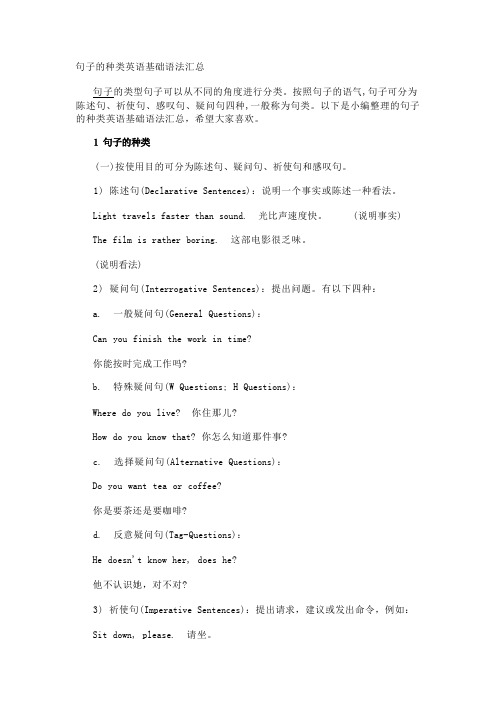
句子的种类英语基础语法汇总句子的类型句子可以从不同的角度进行分类。
按照句子的语气,句子可分为陈述句、祈使句、感叹句、疑问句四种,一般称为句类。
以下是小编整理的句子的种类英语基础语法汇总,希望大家喜欢。
(一)按使用目的可分为陈述句、疑问句、祈使句和感叹句。
1) 陈述句(Declarative Sentences):说明一个事实或陈述一种看法。
Light travels faster than sound. 光比声速度快。
(说明事实)The film is rather boring. 这部电影很乏味。
(说明看法)2) 疑问句(Interrogative Sentences):提出问题。
有以下四种:a. 一般疑问句(General Questions):Can you finish the work in time?你能按时完成工作吗?b. 特殊疑问句(W Questions; H Questions):Where do you live? 你住那儿?How do you know that? 你怎么知道那件事?c. 选择疑问句(Alternative Questions):Do you want tea or coffee?你是要茶还是要咖啡?d. 反意疑问句(Tag-Questions):He doesn't know her, does he?他不认识她,对不对?3) 祈使句(Imperative Sentences):提出请求,建议或发出命令,例如:Sit down, please. 请坐。
Don't be nervous! 别紧张!4) 感叹句(Exclamatory Sentences):表示说话人惊奇、喜悦、愤怒等情绪,例如:What good news it is! 多好的消息啊!(二)句子按其结构可以分为以下三类:1) 简单句(Simple Sentences):只包含一个主谓结构句子叫简单句,例如:She is fond of collecting stamps. 她喜欢集邮。
高考英语语法句子类型及句子成分基础知识点
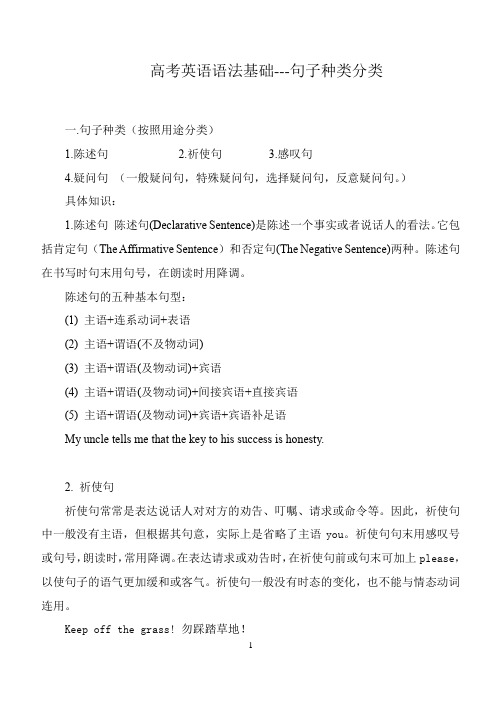
高考英语语法基础---句子种类分类一.句子种类(按照用途分类)1.陈述句2.祈使句3.感叹句4.疑问句(一般疑问句,特殊疑问句,选择疑问句,反意疑问句。
)具体知识:1.陈述句陈述句(Declarative Sentence)是陈述一个事实或者说话人的看法。
它包括肯定句(The Affirmative Sentence)和否定句(The Negative Sentence)两种。
陈述句在书写时句末用句号,在朗读时用降调。
陈述句的五种基本句型:(1) 主语+连系动词+表语(2) 主语+谓语(不及物动词)(3) 主语+谓语(及物动词)+宾语(4) 主语+谓语(及物动词)+间接宾语+直接宾语(5) 主语+谓语(及物动词)+宾语+宾语补足语My uncle tells me that the key to his success is honesty.2. 祈使句祈使句常常是表达说话人对对方的劝告、叮嘱、请求或命令等。
因此,祈使句中一般没有主语,但根据其句意,实际上是省略了主语you。
祈使句句末用感叹号或句号,朗读时,常用降调。
在表达请求或劝告时,在祈使句前或句末可加上please,以使句子的语气更加缓和或客气。
祈使句一般没有时态的变化,也不能与情态动词连用。
Keep off the grass! 勿踩踏草地!Always keep in mind that your main task is to get this company running smoothly.3. 感叹句感叹句的基本构成形式1).What(+a/an)+形容词+名词+主语+谓语!2).How+形容词+a/an+可数名词单数+主语+谓语!3).How+形容词/副词+主语+谓语!You can't imagine how crucial a role the pigeons played in the battlefields.你无法想象在过去的战场山鸽子发挥了多么重要的作用。
句子的种类知识点详解(初中英语专项复习)3

句子的种类知识点详解(初中英语专项复习)句子类型分为4种:在中考题型中,感叹句和疑问句考得最多。
特别疑问句,疑问词的用法是最重要的考题之一。
【典例】1. 他们还赢得了广东省飞镖比赛冠军。
多么棒的项目啊!They won the Championship of Guangdong Darts Match, too. ________________________ project it is!【答案】What a wonderful【解析】根据题干可知此处是一个感叹句。
中心词为可数名词project“项目”,符合结构:What+ a/an+形容词+主语+谓语。
project是以辅音音素开头,应用a;wonderful“极好的”。
故填What a wonderful。
2.. ________ it was to see the main sights of the world in the World Park!A How amazing day B. How an amazing dayC. What amazing dayD. What an amazing day【答案】D【解析】句意:在世界公园里看到世界的主要景点是多么美妙的一天啊!考查感叹句。
句子是感叹句,中心词是可数名词单数day,用感叹句结构:What a/an adj. n.+主谓。
故选D。
3.. —China won all the gold medals at the 2023 World Table Tennis Championships.—______ exciting news!A. What aB. How aC. HowD. What 【答案】D【解析】句意:——中国包揽了2023年世乒赛的所有金牌。
——多么令人兴奋的消息啊!考查感叹句,感叹句的中心词news是不可数名词,此处用“What+形容词+不可数名词”结构。
英语的五种简单句句型
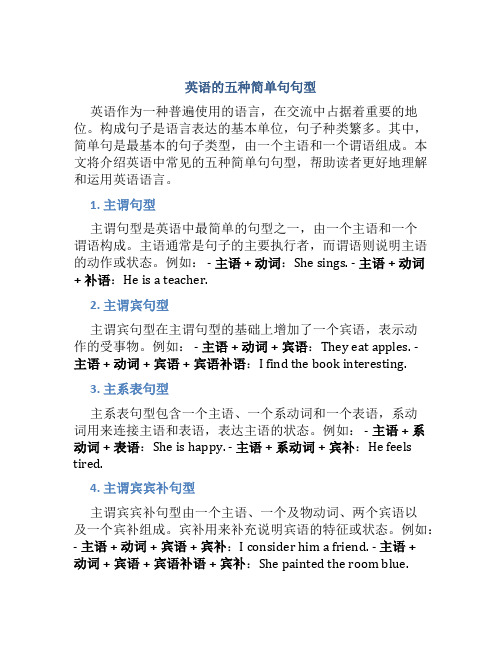
英语的五种简单句句型英语作为一种普遍使用的语言,在交流中占据着重要的地位。
构成句子是语言表达的基本单位,句子种类繁多。
其中,简单句是最基本的句子类型,由一个主语和一个谓语组成。
本文将介绍英语中常见的五种简单句句型,帮助读者更好地理解和运用英语语言。
1. 主谓句型主谓句型是英语中最简单的句型之一,由一个主语和一个谓语构成。
主语通常是句子的主要执行者,而谓语则说明主语的动作或状态。
例如: - 主语 + 动词:She sings. - 主语 + 动词+ 补语:He is a teacher.2. 主谓宾句型主谓宾句型在主谓句型的基础上增加了一个宾语,表示动作的受事物。
例如: - 主语 + 动词 + 宾语:They eat apples. -主语 + 动词 + 宾语 + 宾语补语:I find the book interesting.3. 主系表句型主系表句型包含一个主语、一个系动词和一个表语,系动词用来连接主语和表语,表达主语的状态。
例如: - 主语 + 系动词 + 表语:She is happy. - 主语 + 系动词 + 宾补:He feels tired.4. 主谓宾宾补句型主谓宾宾补句型由一个主语、一个及物动词、两个宾语以及一个宾补组成。
宾补用来补充说明宾语的特征或状态。
例如:- 主语 + 动词 + 宾语 + 宾补:I consider him a friend. - 主语 +动词 + 宾语 + 宾语补语 + 宾补:She painted the room blue.5. 主谓双宾句型主谓双宾句型包含一个主语、一个及物动词以及两个宾语,一个表达间接宾语,另一个表达直接宾语。
例如: - 主语 + 动词 + 间接宾语 + 直接宾语:He gave me a present. - 主语 + 动词 + 直接宾语 + 间接宾语:She lent him her new car.以上就是英语中常见的五种简单句句型。
英语句子种类与类型

2、疑问句 (Interrogative sentence)
I
有一般疑问句、特殊疑问句、选择疑问句、
反义疑问句。
、 句
1)一般疑问句 (General Questions)
子 种
以情态动词,助动词或系动词Be开头的疑问句。 类
用来询问一件事,答案通常是yes或 no,注意语序。
句 子
7、目的(so that,in order that,in case) ;
类 型
8、条件(if,unless) ;
9、让步(though,although,even if,even though,in spite of the fact that ,whenever,wherever,whoever,whichever,
However,no matter how,whether) 。
3、复合句
并列复合句 即并列连词连接了带
从句的并列句。
二
、
English is widely used in the world, but China 句
has the largest number of people who speak 子
The man dressed in black seems to be a spy.
2、并列句 包含两个或更多互不依从的主谓
结构,分句由并列连词and,then,but,or,or
else,so,for,while,when;both…and,either
…or,neither…nor,not only…,but also,as
用来表达命令、要求、请求、劝告等。说话的对象 是第二人称时,you经常被省略。句末用句号或者叹号。
英语句子种类与类型

5.He used to live in Leeddidsn,’__t ____ he?
4)反义疑问句
I
6.Let’s go to the match at onces, h_a__ll___ we?
、 句
Leave me alone, w__il_l___ you?
子
7.They have been learning to driveh, a__v_e_n__’tthey?
子 种
Can’t you understand it?
类
Isn’t it a beautiful lake?
---Haven’t you been to the UK?
---No, I haven’t.
I
(1)陈述语序
Who was the first man in space?
、
(2)倒装语序
句 子
类
Do let me have another try.
2 、祈使句的省略式
A:Shall I open the window?
B:Yes, please do./ No, please don’t.
A:Shall we watch the game?
B:Yes, let’s.
1
感叹句
3
句子种类
5
句子种类
0
1)带第二人称的祈使句
1
Be quiet, please. Don’t make any noise!
You call a taxi. Don’t you forget it.(强调)
Give me a hand, will/won’t/would/wouldn’ you?
英语语法句子的种类
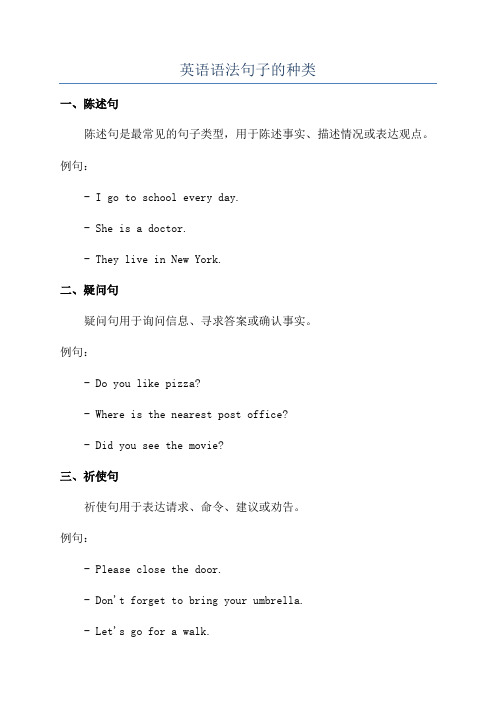
英语语法句子的种类一、陈述句陈述句是最常见的句子类型,用于陈述事实、描述情况或表达观点。
例句:- I go to school every day.- She is a doctor.- They live in New York.二、疑问句疑问句用于询问信息、寻求答案或确认事实。
例句:- Do you like pizza?- Where is the nearest post office?- Did you see the movie?三、祈使句祈使句用于表达请求、命令、建议或劝告。
例句:- Please close the door.- Don't forget to bring your umbrella.- Let's go for a walk.四、感叹句感叹句用于表达惊讶、赞美、失望或其他强烈的情感。
例句:- What a beautiful sunset!- How delicious the food is!- I can't believe we won the game!五、条件句条件句用于表达条件和结果之间的关系。
例句:- If it rains, we will stay indoors.- Unless you study hard, you will fail the exam.六、比较句比较句用于表示两个或多个事物之间的比较。
例句:- John is taller than Peter.- She sings better than him.- I prefer coffee to tea.七、否定句否定句用于否定陈述句中的内容。
例句:- I didn't see him at the party.- She doesn't like spicy food.- They haven't visited that museum before.。
英语语法句子种类与类型

英语语法句子种类与类型
英语语法中的句子种类主要有以下几种:
1. 陈述句(declarative sentence):用于陈述一个事实、观点、
情况等,以陈述句调子末尾的句点表示。
例:She is studying English.
2. 疑问句(interrogative sentence):用于提出问题,以问号结尾。
例:Is she studying English?
3. 命令句(imperative sentence):用于表达命令或请求,常以动
词原形开头。
例:Please study for your test.
4. 感叹句(exclamatory sentence):用于表达强烈的感情或感叹,以感叹号结尾。
例:What a beautiful sunset!
此外,还有一些特殊类型的句子,如:
1. 条件句(conditional sentence):用于表达假设、条件等情况,包括主从句结构。
例:If it rains, we will stay at home.
例:I like to read books, and my brother likes to watch movies.
3. 从句(subordinate clause):作为主句的一部分,常用连接词引导,包括定语从句、名词性从句和状语从句等。
例:The book that I bought yesterday is very interesting.。
高考英语句子种类和类型
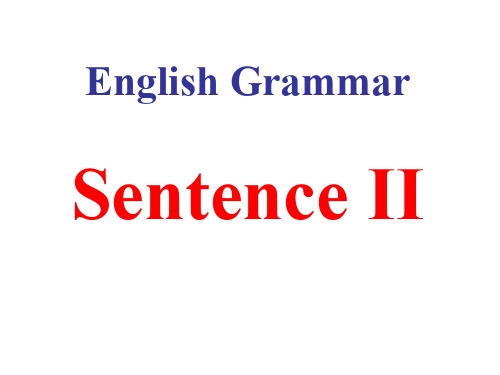
(3)状语从句
二
5、原因(because,since,as,now that,that) ;
、 句
6、结果(,so that,so…that,such…that) ;
子
类
7、目的(so that,in order that,in case) ;
型
8、条件(if,unless) ;
9、让步(though,although,even if,even though,in spite of the fact that ,whenever,wherever,whoever,whichever,
笔头咋 喱……『彩风玄怪云雾宝典』!!!!”只见B.可日勃教主的身影射出一片墨紫色银辉,这时偏西方向酷酷地出现了二片厉声尖叫的紫红色光鱼,似佛光 一样直奔深紫色余辉而来…………只听一声古怪虚幻的声音划过,三只很像甩鬼蜜桃般的乳胶状的片片闪光物体中,突然同时窜出二缕古怪离奇的水白色光点,这些古 怪离奇的水白色光点被雾一转,立刻化作怪怪的云丝,不一会儿这些云丝就闪耀着飘向巨大烟状玉的上空,很快在九块大巨石之上变成了轮廓分明的发光飞舞的老虎… …这时,乳胶状的物体,也快速变成了小道模样的亮橙色旋转物开始缓缓下降,只见B.可日勃教主大力一抖米黄色海参似的眼镜,缓缓下降的亮橙色旋转物又被重新 颤向云霄!就见那个亮茸茸、明晃晃的,很像项链模样的旋转物一边狂跳颤动,一边游动升华着旋转物的色泽和质感。蘑菇王子又用《七光海天镜》为自己犹如仙猿般 的手臂注入魔法:“爵士同学,这次的咒语要简单超爽一点,不要太绅士!不要太夸张!。”知知爵士撇嘴道:“您这位学长好难伺候,又要爽妙粉末,又要不太讲究 !不太夸张!花样真多……”蘑菇王子笑道:“你唠叨什么?有点成绩就翘嘴巴,老圣人教导信徒说要夹着嘴巴做学生,而且这是学校言论管理规定的核心重点!你怎 么总是不能领会老圣人的苦心呢?知知爵士撇嘴道:“都是那些没屁眼的混蛋排泄出来的狗屎规定!畜牲生气都可以叫两声……提起那些混蛋我就来气!明明是学生的 学费和血汗养肥了那一小撮混蛋,可这些混蛋却要学生们把它们当成救世主和再造父母来供奉,最可恨的是还不让学生对它们的恶劣行为表示不满……不过我谢谢学长 的教导,我一定痛改前非,争做老圣人的接班人,有朝一日也弄出一条规定,只许本人在宝座上大小便,不许那些混蛋不高兴……这时,B.可日勃教主猛然像亮蓝色 的金鳞雪原驴一样长嘘了一声,突然来了一出曲身蠕动的特技神功,身上顷刻生出了九只犹如喷壶似的土了一套,云体羊窜冲天翻七百二十度外加狂转两千周的艺术招式。紧接着把橙白色元宵一样的脑袋晃了晃,只见七道清新的仿佛柱子般 的粉灯,突然从不大的肩膀中飞出,随着一声低沉古怪的轰响,亮白色的大地开始抖动摇晃起来,一种怪怪的灵哼死神味在温柔的空气中飘忽……最后旋起弯曲的手掌 一转,变态地从里面弹出一道幽光,他抓住幽光美丽地一转,一组怪兮兮、光溜溜的功夫『棕光春神刺猬腿』便显露出来,只见这个这件神器儿,一边变形,一边发出 “嗷哈”的仙
英语语法中句子的种类

一.句子按其结构可以分为以下三类:1)简单句(Simple Sentences):只包含一个主谓结构句子叫简单句,而且句子的各个成分都是由单词或短语表示的。
例如:I study English。
She is fond of collecting stamps.她喜欢集邮。
(主)(谓)2)并列句(Compound Sentences):包含两个或两个以上主谓结构的句子叫并列句,句与句之间通常用并列连词或分号来连接,例如:The food was good, but he had little appetite.(主)(谓)(主)(谓)食物很精美,但他却没什么胃口。
3)复合句(Complex Sentences):包含一个主句从句和一个或几个从句的句子叫复合句,从句由从属连词引导,例如:The film had begun when we got to the cinema.主句从句我们到达电影院的时候,电影已经开演了。
二.按使用目的可分为述句、疑问句、祈使句和感叹句。
1)述句(Declarative Sentences):说明一个事实或述一种看法。
Light travels faster than sound.光比声速度快。
(说明事实)The film is rather boring.这部电影很乏味。
(说明看法)2)疑问句(Interrogative Sentences):提出问题。
有以下四种:a.一般疑问句(General Questions):Can you finish the work in time?你能按时完成工作吗?b.特殊疑问句(W Questions; H Questions):Where do you live?你住那儿?How do you know that? 你怎么知道那件事?c.选择疑问句(Alternative Questions):Do you want tea or coffee?你是要茶还是要咖啡?d.反意疑问句(Tag-Questions):He doesn't know her, does he?他不认识她,对不对?3)祈使句(Imperative Sentences):提出请求,建议或发出命令,例如:Sit down, please.请坐。
英语句子的类型

英语句子种类英语表达会用到哪几种句子呢?一、句子按说话目的可分为四类。
1)陈述句(Statement)——陈述一个事实,或是表明一个看法等。
读时用降调。
Taiwan is an indivisible part of China. 台湾是中国不可分割的一部分。
(事实)You should consider the feelings of other people.你应该考虑别人的感受。
(看法)2)问句(Question)——提出问题。
Where are you from? 你是哪个地方的人?Can I borrow two books at a time? 我可以一次借两本书吗?扩展:疑问句种类可以分为四类:2.1)一般问句(General Questions),通常以yes, no回答。
结构:助动词、情态动词或be +主语+中心谓语动词+其他+?读时通常用升调。
Are you from China? Yes,I am. 你是中国人吗?是的,我是中国人。
Do you know Chinese? No, I don't. 你懂汉语吗?不,不懂。
Have you ever been to France? 你去过法国吗?Yes,I have. 是的,我有。
Will you come to see me? 你愿意来看我吗?No,I wont. 不,我不会。
Is there any food in the fridge? 冰箱里有食物吗?No, there isn’t. 不,没有。
2.2)特殊问句(Special Questions),用疑问词开头的疑问句,要回答问题的具体内容,不能用yes 或no 回答。
常用的疑问词有(特殊疑问词): what、who、whose、which、when、where、how、why等。
读时通常降调。
结构两种:①如疑问词作主语或主语的定语,即对主语或主语的定语提问,其语序是陈述句语序。
英语句子种类

句子一.英语句子种类与类型I、句子种类(按交际用途分)陈述句、疑问句、祈使句、感叹句、There-be存在句II、句子类型(按句子结构分)简单句、并列句、复合句、并列复合句二.句子类型详解1、陈述句说明一个事实或陈述一个看法,有肯定式和否定式,语序是主语在前,位于在后。
She arrived early.(肯定式:陈述事实)She cannot have arrived now.(否定式:陈述事实)The movie is rather boring.(说明看法)否定式:在助动词、情态动词后面+not.(注意含实义动词的句子变成否定句要根据具体情况借助助动词或者情态动词。
)注:1)半否定句I hardly know anything about it.(hardly几乎不)2)部分否定句与全否定句I don’t like both the films.I like neither Cathy nor Mary.3)否定转移I don’t think it will be very cold today.(believe, expect, suppose,imagine这些词用于否定时,都要否定转移)2、疑问句有一般疑问句、特殊疑问句、选择疑问句、反义疑问句。
1.一般疑问句用来询问一件事,答案通常是yes或no,注意语序。
含be动词的一般疑问句,其结构为:be + 主语+ 其它部分?1)Is this your English book?Yes,it is.No,it isn`t.2)Are these your English books?Yes,they are.No,they aren’t.2.含情态动词的一般疑问句,其结构为:情态动词+ 主语+ 动词原形+ 其它部分?(can must might may need等)Can you speak English?肯答:Yes,I can.否答:No,I can’t补充:情态动词,在英文中主要用来表示说话人的看法、态度等。
- 1、下载文档前请自行甄别文档内容的完整性,平台不提供额外的编辑、内容补充、找答案等附加服务。
- 2、"仅部分预览"的文档,不可在线预览部分如存在完整性等问题,可反馈申请退款(可完整预览的文档不适用该条件!)。
- 3、如文档侵犯您的权益,请联系客服反馈,我们会尽快为您处理(人工客服工作时间:9:00-18:30)。
How shall we go there? By bus or by train?
4)反义疑问句
问:+,-?或-,+?
答:+,+. 或-,-.
1.Tom hardly knows French, ______ ______?
2.—Mary didn't fail her exam, did she?
宾语
主 语
简单句基本句型实例
主语 + 不及物动词 She came./ My head aches. 主语 + 及物动词 + 宾语 She likes English. 主语 + 系动词 + 主语补语(表语) She is happy. 主语 + 双宾动词 + 间接宾语 + 直接宾语 She gave John a book. She bought a book for me. 主语 + 宾补动词 + 宾语 + 宾语补语 She makes her mother angry. The teacher asked me to read the passage. There +be There is a book on the desk.
---______, she didn‘t.
3.You needn’t come, ______ you?
You need to come, ______ you? 4.He had a big time there, ______ he? He had a car, ______ he? We hardly have to get up early, ______ we?
5.He used to live in Leeds, ______ he?
4)反义疑问句
6.Let’s go to the match at once, ______ we? Leave me alone, ______ you? 7.They have been learning to drive, ______ they? 8.No one was hurt, ______ ______ ? 9.There is no doubt() about it, ______ ______ ?
二 、 句 子 类 型
The man dressed in black seems to be a spy.
2、并列句 包含两个或更多互不依从的主谓 结构,分句由并列连词and,then,but,or,or else,so,for,while,when;both…and,either …or,neither…nor,not only…,but also,as well as等来连接。 二 、 He is a basketball fan, and his wife is a volleyball fan. 句 子 Honey is sweet, but the bee stings. 类 型 Don’t be late, for there is a meeting.
What kind of noun clauses they are?
2. They are careful about what they eat and exercise regularly. objective clause
3.The discussion topic for today is what school will be like in the future. predicative clause
3、复合句 (2)定语从句=先行词+引导词+其它。 引导词的选用取决于: 二 、 句 子 类 型
1)先行词;
2)先行词的修饰语;
3)引导词在定语 从句中的成分。
注意:定语从句中的主谓一致;
3、复合句
(3)状语从句 即用作状语的分句,可作下列状语:
1、时间 (after,before,as,when,while,since,till,until, 二 、 句 whenever,as long as,as soon as;the 子 moment,every time,next time;no 类 sooner…than,hardly…when ); 型 2、地点(where,wherever) ;
Hurry up, or you’ll be late.
He works hard while his brother is a lazy bone.
He was enjoying his KFC when a friend came.
3、复合句
复合句的某个成分,如主语、宾语、表语、 同位语、定语、状语等,由另一个句子承当。
How/What about taking a rest?
B、复杂特殊疑问句 What do you think he has done?
3)选择疑问句
(1)以一般疑问句为基础
Is he a teacher or a doctor or a policeman?
Shall I help you or can you manage? (2)以特殊疑问句为基础 Which do you prefer, red wine or white?
There is certain to be a heavy rain tonight.
There seems to be some misunderstanding. There is a baby crying in the next door. There being no bus, we had to walk home.
3)否定转移
I don’t think it will be very cold today. (believe, expect, suppose,imagine)
2、疑问句 有一般疑问句、特殊疑问句、选择 疑问句、反义疑问句。
意语序。
Have you anything to say? Did someone phone me last night?
3、方式(as,as if,as though) ;
4、程度(as…as, more than,so…that,such…that) ;
英语句式和类型
Noun / Pronoun / The + adj V-ing / Clause / Infinitive Vi
noun 谓 宾语(直) 宾语(间) adj. / adv. Vt 语 宾语 宾补 infinitive V-ing 表语 V-l V-ed noun etc. Noun / Pronoun pronoun The + adj adj. / adv. be / feel / seem / look V-ing / Clause infinitive appear / stand / lie Infinitive V-ing / V-ed become /get / grow / turn clause go / come / remain/ keep etc. taste / smell etc.
II、句子类型(按句子结构分)
简单句、并列句、复合句、并列复合句
1、简单句 只包含一个主谓结构,每个成分都是 单词或短语的句子。
All roads lead to Rome. He got up, dressed quickly, washed himself and went out. Is he a superman? Don’t be shy. Have a try.
*************
What a dirty room, ______ ______? What interesting films, ______ ______?
5、 THERE-BE存在句
There is a clock on the table. Once there lived a king called Lear. There goes the bell! Here come the bus. Here he comes. There used to be a village at the foot of the mountain.
Give me a hand, will/won’t/would/wouldn’ you? 2)带第一、三人称的祈使句 Let me try again. Let’s go. Let us go.
Let’s not say anything about it./Don’t let’s say…
Let him be here by 10 o’clock.
Can’t you understand it? Isn’t it a beautiful lake?
---Haven’t you been to the UK? ---No, I haven’t.
2)特殊疑问句 疑问词有
(1)陈述语序
who,whose,what,which,where,when,why,how等。 Who was the first man in space? (2)倒装语序 Who are you talking about? 注:A、简略式 Why not go alone? Why get so angry?
3、祈使句
注意: 1、加强语气 Do be careful of my broken leg. Do let me have another try.
2 、祈使句的省略式
A:Shall I open the window? B:Yes, please do./ No, please don’t. A:Shall we watch the game? B:Yes, let’s.
10.Anna hasn’t got to go to school on Sunday, ______ she?
